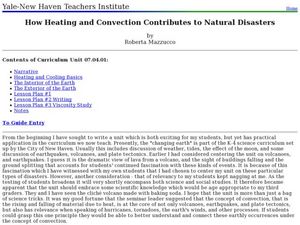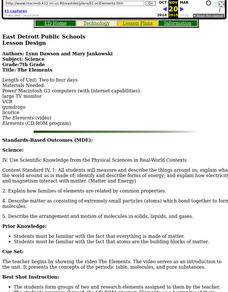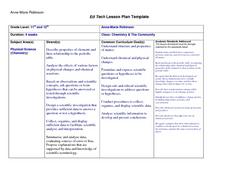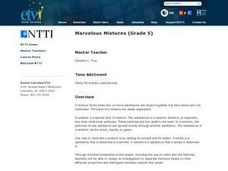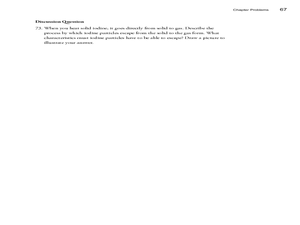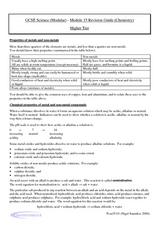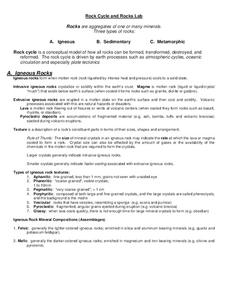Curated OER
How Heating and Convection Contributes to Natural Disasters
Students study the basics of heating and cooling and how it pertains to the earth. In this global lesson students read the Magic Tree House book then create a chart of their findings.
Curated OER
Cooking Up an Explanation
Students pose scientific questions about food items and research their explanations. They then create recipe cards with the answers and present their findings in a cooking show format.
Curated OER
The Elements
Young scholars watch video, The Elements, research information about elements using both the Internet and CD-ROM program, and create atoms out of gumdrops and licorice.
Curated OER
Freeze Pops
Students experience problem-based learning as they use prior knowledge of the states of matter to keep a frozen juice bar from melting.
Curated OER
Fahrenheit Follies
Second graders analyze the effects of sunlight on a glass of water by using the thermometer to measure its temperature. They predict and measure the difference between water outside in the sun and shade and inside. They role-play a game...
Curated OER
Energy Efficient Buildings
Seventh graders create plans for an energy efficient addition to the school. They work in small groups with each group having responsibility for examining one aspect of the problem. They create working diagrams and a model of their...
Curated OER
Chemistry & The Community
Students complete a Webquest which investigates the chemistry in items such as shampoo. They research the Internet, perform a lab experiment, and write a scientific lab report with their findings. Upon completion of the activities, the...
Curated OER
What's the MATTER in our School?
While working in small groups, students use a digital camera to take pictures of various states of matter around the school grounds. Then they download the images onto the computer. The students then have to type or list the three states...
Curated OER
Earth's Atmosphere
In this Earth's atmosphere worksheet, learners match 8 terms about the layers of the atmosphere and the components of the atmosphere with their definitions. They complete 5 sentences with the proper terms about the air of the atmosphere...
Curated OER
Sound: What is Sound and how does it travel?
Students learn that vibration makes different types of sounds. In this sound lesson plan, students perform experiments to understand vibrations and high and low pitch sounds. Students learn that sound travels differently through...
Curated OER
Marvelous Mixtures
Fifth graders design an experiment in which they separate mixtures. In this mixtures lesson plan, 5th graders define mixtures, solutions, solutes, and solvents. They watch a video, complete worksheets, and perform an experiment to...
Curated OER
The Phenomenon of Sound: Waves
Students explore sound waves. In this sound waves lesson, students brainstorm different sounds and how sounds move or travel. Students then create a KWL chart and work through six different lab activities to examine how sound waves...
Curated OER
Force and Motion
Students experiment with force and motion. In this force and motion instructional activity, students test gravity using a variety of objects. Students rotate through a series of stations which use force, motion, friction, and inclines....
Curated OER
Greenhouse Effect: Pop Bottle Experiment
Students explore global warming by conducting a weather experiment. In this greenhouse gas lesson, students define the greenhouse effect and the impact on our ozone layer. Students utilize a soda pop bottle, floodlight bulb, thermometers...
Curated OER
The Structure of Matter and the Chemical Elements
For this chemistry worksheet, students answer 73 fill in the blanks and multiple choice questions on the structure of matter and properties of elements in the periodic table.
Curated OER
Periodic Table of Elements
In this science worksheet, students examine the graph with elements in order to differentiate atomic mass and categorizing the content.
Chymist
The Solubility of a Salt in Water at Various Temperatures
An educational activity allows young chemists to test the solubility of different types of salt at various temperatures. Groups create a graph using data from unsaturated, saturated, and supersaturated solutions.
Curated OER
Metals and Non-metals
A half-page chart compares the properties of metals and nonmetals. Properties include appearance, melting and boiling point, density, strength, malleability, ductility, heat and electrical conductivity, and the nature of their oxides....
Curated OER
Revision Guide - Chemistry
Don't you wish you had the time to type up a study guide for your chemistry class? With this resource, there is no need! A chart comparing the properties of metals and non-metals tops the handout, followed by notes on the reactivity...
Curated OER
Metals and Non-Metals
A table of the physical properties of metals and non-metals opens this high-school chemistry handout. Also covered are the chemical properties of metals and non-metals, reactivity, and fossil fuels. There are no specific questions to...
Teach Engineering
Floaters and Sinkers
Whatever floats your boat. Young engineers learn about density by measuring the masses and volumes of boxes filled with different materials. Using their knowledge of densities, they hypothesize whether objects with given densities will...
Curated OER
Volcanoes: Windows Into The Earth
Students investigate the concepts related to volcanoes and focus upon Mt. St. Helens. They define the difference between an active and dormant volcano. They conduct research using a variety of resources. The information is used in order...
Curated OER
CO2 and You
Students study the scientific evidence about carbon dioxide emissions. They learn to calculate the amount of energy used by different appliances. They complete a worksheet which analyzes the amount of energy that their home uses.
University of New Orleans
Rock Cycle and Rocks Lab
Science rocks! Explore three types of rocks and the rock cycle with an igneous rocks experiment. Pupils discuss textures, composition, and learn how melts are formed from the Earth's crust. They weigh materials using a scientific scale...


